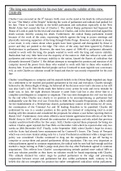Essay
King Charles I was responsible for his own fate in 1649 assess the validity of this view.
- Course
- Institution
- Book
23/25 A* essay on “King Charles I was responsible for his own fate in 1649 assess the validity of this view." For a level AQA history - component 2E - The English Revolution 1625-60
[Show more]




